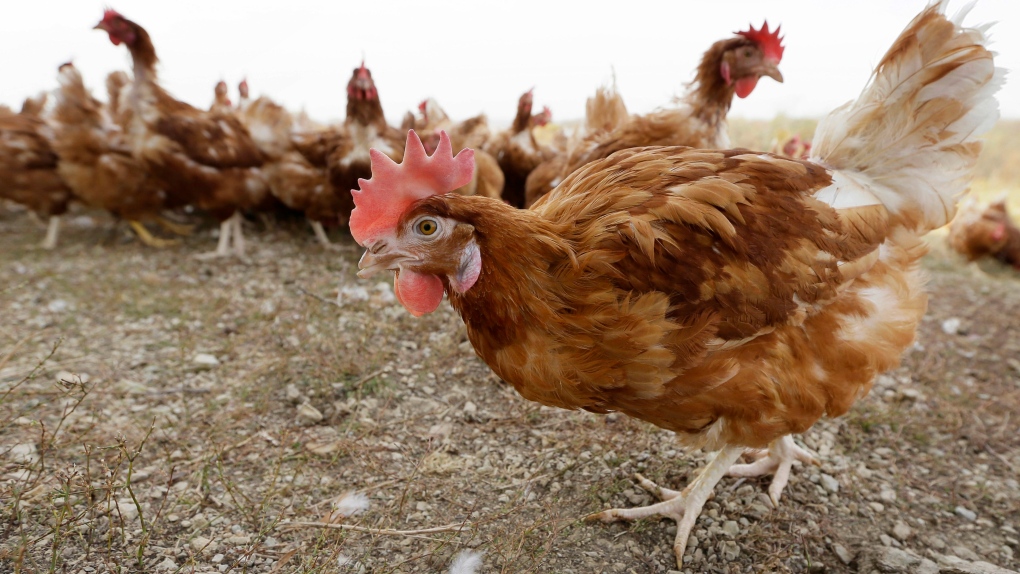
BREAKING International students will be allowed to work 24 hours a week starting in September
Immigration Minister Marc Miller says international students will be able to work off-campus up to 24 hours per week starting in September.
Nebraska agriculture officials say another 1.8 million chickens must be killed after bird flu was found on a farm in the latest sign that the outbreak that has already prompted the slaughter of more than 50 million birds nationwide continues to spread.
The Nebraska Department of Agriculture said Saturday that the state's 13th case of bird flu was found on an egg-laying farm in northeast Nebraska's Dixon County, about 120 miles (193 kilometres) north of Omaha, Nebraska..
Just like on other farms where bird flu has been found this year, all the chickens on the Nebraska farm will be killed to limit the spread of the disease. The U.S. Department of Agriculture says more than 52.3 million birds in 46 states -- mostly chickens and turkeys on commercial farms -- have been slaughtered as part of this year's outbreak.
Nebraska is second only to Iowa's 15.5 million birds killed with 6.8 million birds now affected at 13 farms.
In most past bird flu outbreaks the virus largely died off during the summer, but this year's version found a way to linger and started to make a resurgence this fall with more than 6 million birds killed in September.
The virus is primarily spread by wild birds as they migrate across the country. Wild birds can often carry the disease without showing symptoms. The virus spreads through droppings or the nasal discharge of an infected bird, which can contaminate dust and soil.
Commercial farms have taken a number of steps to prevent the virus from infecting their flocks, including requiring workers to change clothes before entering barns and sanitizing trucks as they enter the farm, but the disease can be difficult to control. Zoos have also taken precautions and closed some exhibits to protect their birds.
Officials say there is little risk to human health from the virus because human cases are extremely rare and the infected birds aren't allowed to enter the nation's food supply. Plus, any viruses will be killed by properly cooking poultry to 165 degrees Fahrenheit.
But the bird flu outbreak has contributed to the rising prices of chicken and turkey along with the soaring cost of feed and fuel.

Immigration Minister Marc Miller says international students will be able to work off-campus up to 24 hours per week starting in September.
Toronto police say 12 people are facing a combined 102 charges in connection with an investigation into a major credit fraud scheme.
Members of Parliament are questioning why Canadian security officials did not inform them that they had been the target of Beijing-linked hackers, after learning from the FBI that the international parliamentary alliance they are a part of was in the crosshairs of the Chinese cyberattack in 2021.
Norovirus is spreading at a 'higher frequency' than expected in Canada, specifically, in Ontario and Alberta, according to the Public Health Agency of Canada.
B.C. Premier David Eby has joined other politicians denouncing remarks at a demonstration in Vancouver where protesters chanted “long live Oct. 7,” praising that day's attacks by Hamas on Israel.
Moderate drinking was once thought to have benefits for the heart, but better research methods have thrown cold water on that.
Tobacco manufacturers have until Tuesday to ensure every king-size cigarette produced for sale in Canada has a health warning printed directly on it.
The clock is ticking ahead of the deadline to file a 2023 income tax return. A personal finance expert explains why you should get them done -- even if you owe more than you can pay.
Anne Hathaway first shared she lost interest in drinking after a bad hangover in 2018. She’s now five years sober.

Since 1932, Montreal's Henri Henri has been filled to the brim with every possible kind of hat, from newsboy caps to feathered fedoras.
Police in Oak Bay, B.C., had to close a stretch of road Sunday to help an elephant seal named Emerson get safely back into the water.
Out of more than 9,000 entries from over 2,000 breweries in 50 countries, a handful of B.C. brews landed on the podium at the World Beer Cup this week.
Raneem, 10, lives with a neurological condition and liver disease and needs Cholbam, a medication, for a longer and healthier life.
The lawyer for a residential school survivor leading a proposed class-action defamation lawsuit against the Catholic Church over residential schools says the court action is a last resort.
Mounties in Nanaimo, B.C., say two late-night revellers are lucky their allegedly drunken antics weren't reported to police after security cameras captured the men trying to steal a heavy sign from a downtown business.
A property tax bill is perplexing a small townhouse community in Fergus, Ont.
When identical twin sisters Kim and Michelle Krezonoski were invited to compete against some of the world’s most elite female runners at last week’s Boston Marathon, they were in disbelief.
The giant stone statues guarding the Lions Gate Bridge have been dressed in custom Vancouver Canucks jerseys as the NHL playoffs get underway.
 Chickens walk in a fenced pasture at an organic farm in Iowa on Oct. 21, 2015. (AP Photo/Charlie Neibergall, File)
Chickens walk in a fenced pasture at an organic farm in Iowa on Oct. 21, 2015. (AP Photo/Charlie Neibergall, File)